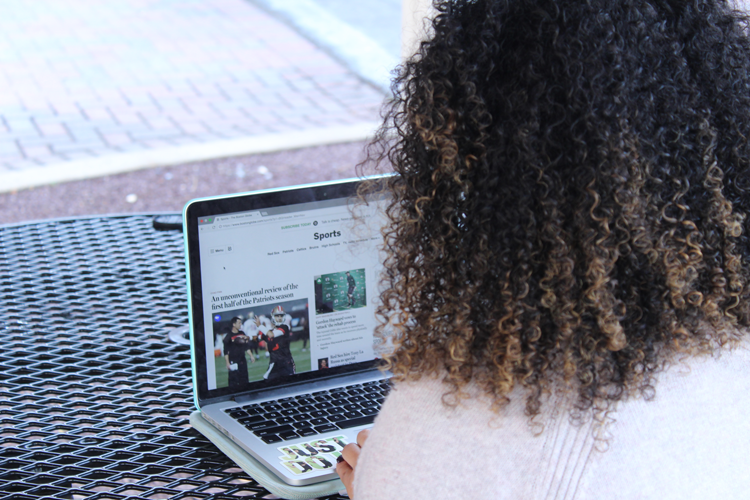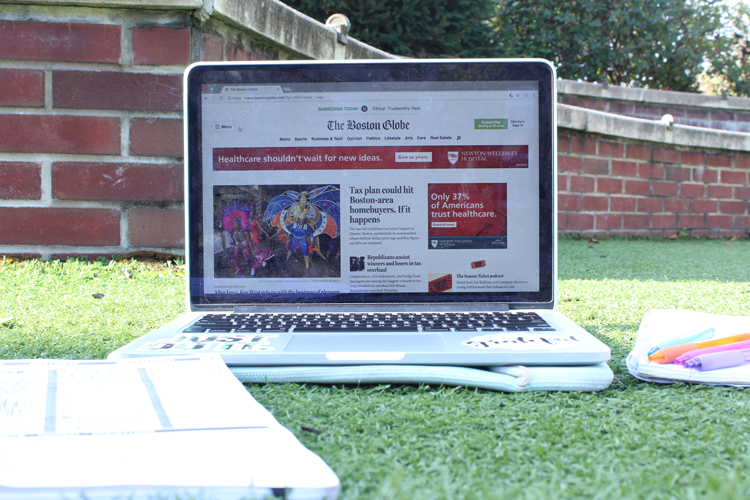As journalism students, it can be tough to figure out how to prepare yourself before graduation. Unlike medical and engineering students, there isn’t one set of classes to take in order to graduate and get a well-paying job. We first have to figure out what exactly in journalism we want to do and then do everything we can to help us get there. This includes skills courses, networking and of course, internships.
But before getting those internships, we must provide a resume and cover letter. The Boston Globe sports producer, Rachel Bowers gives us her personal advice on how to go about that. Throughout her career, Bowers has written, edited, designed, handled websites and covered almost every sport.
She has had much experience since graduating college so continue reading to see how her tips can help you become a stronger candidate when applying for internships.
How did you get started as a sports producer for The Boston Globe?
When I graduated school, I had no idea what I wanted to do. I became a paginator in Florida. After a while, I left that because I knew I wanted to get into something that had more emphasis on my digital skill set. So I became the assistant editor in a local newspaper in my home town. When I was there, I wrote, I edited, did social media and helped managed the website. After a couple of years, I started looking at journalism job boards, and was lucky enough to stumble upon The Boston Globe listing. I spent an entire day writing my cover letter. I sent it in and somehow, they called me back. I did a couple of phone interviews. They flew me up for more interviews where I was interviewed by about four people. Then a couple days later they offered me the job.
According to your Linkedin, as a sports producer, you do a variety of tasks: Manage daily operation of the sports vertical, including editing, writing, aggregating, running social accounts, and assigning stories when necessary. How can students prepare for such a variety of tasks from early on? What should college students be doing that will increase their chances of getting hired?
- Have a diverse diet for what you’re reading and consuming. That can influence what you can pivot to next in your job. If you see something else that was really cool, that could spark something in your mind.
- Go towards the stuff that makes you a little bit scared. And sacred meaning, can I pull this off? Those projects that are stressful are what help you grow and help you sharpen your tools in your tool kit. This makes you realize, you know what? I can tackle this. This will toughen you up. It will make you feel nervous on the front end, but you pull it off.
- Read a lot. Consume a lot of content of different varieties.
- If you don’t know something, teach yourself. We live where the internet can give you the answer.
Or if there’s something you want to learn, reach out to people doing that job. Say, “hey could I pick your brain?” Those people will be open to that. That’s true for me. Be curious.
Any specific tips for students looking into sports journalism?
In my experience, sports has been a place where you can usually have more freedom to try different stuff that the newsroom isn’t doing or been able to do. Sports is a place where you can try new projects, not to say that you can’t with news, but sports is a place where you can do that a little bit more.
If you have a new idea try it. Don’t not try something because you’re scared to do something. Especially when you’re in a small place. You may have less resources, but you also have less people to run it by. But if you were at a larger place, you have to run that thing all the way up the ladder. You can cut your teeth more with a smaller team.
It’s a great place to tell a story. I love sports because sports is a mirror for society. Right now we’re talking about what it means to be a patriot and what it means to be patriotic and that’s because of sports. Because professional athletes wanted to protest during the national anthem.
What should/should not be on a resume?
- Education
- Skills. If you can speak another language, edit videos, know how to produce a podcast, are a wiz in Excel, if you can code, what kind of code? HTML, CSS, Javascript? Or if you have an award or was part of a team who received an award. Add all that.
- Work Experience. Highlight the things you have done. It doesn’t have to be an exhausted list. Keep it brief. Put what the basic responsibilities are. Make it a place where you’re presenting your best self on a piece of paper. I am not a fan of more than one page but that’s my personal preference.
- References. I add references because it’s one less step in the communication process. I include it to indicate I have a good working relationship with my bosses. My boss now is a reference. I have a good relationship with my past two bosses as well.
What is something you always see on a resume, but is a big mistake?
I think the biggest thing is to proof read. Proof read it. Use spell check. Have other people read it. Make sure you don’t have any incomplete sentences. Make sure your college is spelled right. Make sure the commas are in the right place. I know people who didn’t get a job because of one misspelling.
Anything interesting you saw on a resume that was something you thought enhanced the resume?
If you can speak another language, edit videos, know how to produce a podcast, are a wiz in Excel, if you can code, what kind of code? HTML, CSS, Javascript? Or if you have an award or was part of a team who received an award. Add all that.
Not necessarily. I don’t think resumes need to be longer than a page, especially if you are a younger person, not to diminish experience. But I know people who have been a journalist for more than 20 years and theirs are a page. I don’t need to know everything you have done. I just want to know the best stuff. Brevity is important.
How do you feel about designs and designing your resume?
It’s not necessary.
When it comes to resumes, I like going for a clean design. Keep it clean. Keep it simple.
Feel free to look up designs, but what you want to achieve is to make is as clear and readable as possible. Make the entry points clear. Make the headers stand out. Make sure the tight spaces are correct. I think you can add personal flare. A colleague of mine has her signature at the top of her resume instead of her name printed. I think the most important thing though is that it’s clear.
How should we go about cover letters?
It should be short. Max 400 words. This is all just a personal preference. There isn’t some grand set of rules. I think they should emphasize how the work you have done can translate into the position you are applying for. If you’re applying for an editing job, emphasize that you’re a good communicator and coordinated coverage for xyz.
Emphasize the type of work you want to do in job you’re applying for. What do you bring to the table that makes you a good candidate?
No hard or fast rules when it comes to cover letters at all. These are just my thoughts. This varies place to place. I know some places that give you an edit test rather than a cover letter. Like pick three news stories over a week and write a post about them. It all depends but if we’re talking about a general cover letter, then this would be a generic format. Highlight the skills that you have in your current position that would help you succeed in the position you’re applying for.
How do you go about formatting?
If there’s no specific instructions, I write…
- I am writing to apply for…
- In my x amount of years, I have…
- Write a paragraph of what u bring
- Looking forward to seeing you…
- Make it about three paragraphs then sign
What are the do’s and don’ts to cover letters?
- Don’t make it long. This is one of my views. Don’t make them long.
- Don’t address it to the wrong person. If you’re applying for a bunch of jobs at once and forget to change a name. Proof read them.
- Do have a boiler plate cover letter then mold and shape them as needed.
Connect with Rachel Bowers on LinkedIn and Twitter.
Digital Marketing & Social Media Internship Seminar in Madrid, Spain


